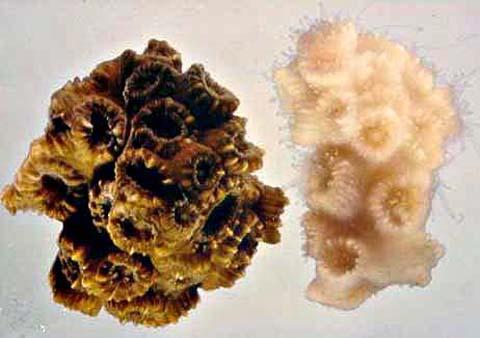 Many stories have come to light through recent years discussing the plight of coral reefs around the world; overfishing, destructive collecting methods, pollution, and ship traffic damage have taken a serious toll. A number of new studies show that an even greater threat has emerged in 2010, extreme water temperatures.
Many stories have come to light through recent years discussing the plight of coral reefs around the world; overfishing, destructive collecting methods, pollution, and ship traffic damage have taken a serious toll. A number of new studies show that an even greater threat has emerged in 2010, extreme water temperatures.
Earlier this year, the region of Indo-pacific reefs known as the Coral Triangle (a roughly triangular area that encompasses Indonesia, Malaysia, Papua New Guinea, the Philippines, Solomon Islands and Timor-Leste) endured record surface water temperatures. These extreme water temperatures caused a mass coral bleaching event that may prove to be the worst on record.
Coral bleaching occurs when a coral is stressed by environmental conditions (heat, pollution, ect….). The coral expels the symbiotic algae that lives within its tissue, the zooxanthellae. These tiny living things are what gives corals their amazing colors, and they also provide energy and oxygen to their host corals. Without the algae present in their delicate, transparent tissues, the underlying white coral skeleton is visible giving the coral a white or “bleached” appearance. When “bleached” a coral is weakened, becoming susceptible to disease and increaased mortality.
“It is certainly the worst coral die-off we have seen since 1998. It may prove to be the worst such event known to science,” says Dr. Andrew Baird of the ARC Centre of Excellence for Coral Reef Studies and James Cook Universities. “So far around 80 percent of Acropora colonies and 50 per cent of colonies from other species have died since the outbreak began in May this year.”
Temperatures in the upper 80’s to low 90’s were recorded throughout the area by divers and fishermen. A friend of ours who visits the Philippines regularly was quite disheartened at the state of reefs that he has visited many times. He too recorded temperatures in the upper 80’s at depths up to 30 feet.
Currently there are dangerously high surface water temperatures present in the Atlantic and Caribbean ocean, that have corals in these areas at a severe risk of bleaching as well. NOAA, the National Oceanic and Atmospheric Administration, Coral Reef Watch program has an excellent website for tracking water conditions around the world. The site shows satellite data for ocean temperatures in near real time, and shows information in  stress scales based upon current conditions compared to historical data. Check it out, the site is very cool, and alarming at the same time.
stress scales based upon current conditions compared to historical data. Check it out, the site is very cool, and alarming at the same time.
Climate change is undeniable, and is having a direct and profound impact on coral reefs around the world. How this will affect the aquarium hobby is still unknown, but change is coming. Reefs have survived climate changes for millions of years, they are amazingly resilient. Human enhanced climate change is going to provide reefs with what may be their biggest challenge ever.
Until Next Time,
Dave
 That Fish Blog – Aquarium Advice and Information
That Fish Blog – Aquarium Advice and Information



As a Beginner, I’m continually surfing about on-line for content material that could benefit myself. Thank you